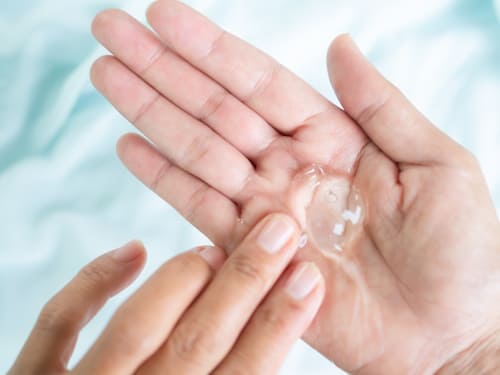A current TikTok trend in skin care called "slugging" is a revival of an old skin care idea, and is all about putting on a thick layer of moisturizer or oil on your skin, typically petroleum jelly, before you go to bed. The idea is to create a protective barrier, which helps your skin hold onto as much moisture as possible and makes it look and feel hydrated.
Petroleum jelly is used in health care for wound care, and it has some unique and somewhat surprising benefits. Having said that, we think you can do better than slugging for acne. Much better.
Also read: How to choose the best acne treatment
Biggest Take-Aways:
-
Slugging is a TikTok trend in skincare that involves putting on a thick layer of moisturizer or oil on your skin, typically petroleum jelly, to create a protective barrier that helps skin hold onto as much moisture as possible and makes it look and feel hydrated.
-
While there is some evidence to suggest that petroleum jelly can have positive effects on the skin, there is no scientific evidence to support the use of slugging for acne, and it may actually exacerbate acne for some individuals.
-
Several dermatologists have cautioned against the practice of slugging for individuals with acne-prone skin because it can create an environment that traps oil, dead skin cells, and bacteria on the skin's surface, potentially leading to clogged pores and more acne.
-
To manage acne breakouts effectively, it is better to use scientifically-proven skincare routines that address the root cause of acne, such as a kit from Exposed, which contains high-quality and scientifically-proven active ingredients that help to effectively treat acne.

The Benefits Of Petroleum Jelly
A study published in the 'Journal Of Allergy And Clinical Immunology' in 2015 looked at how using petrolatum, a common product used to prevent skin infections or treat a skin condition called atopic dermatitis, affects the skin at a molecular level.
The study was done on 36 healthy people and 13 people with moderate atopic dermatitis using advanced techniques to measure changes in the skin.
-
The results showed that using petrolatum caused positive changes in the skin, such as increased production of antimicrobial peptides and improved skin barrier function.
-
It also showed increased levels of certain genes involved in skin health. These findings suggest that petrolatum can have positive effects on the skin.
There is no doubt petroleum jelly will continue to be successfully used in the prevention of skin infections after ambulatory surgeries and as maintenance therapy for atopic dermatitis.
What Science Says About Managing Acne Breakouts With Slugging
There is no scientific evidence to support the use of slugging for acne, and it may actually exacerbate acne for some individuals.
As mentioned earlier, slugging involves applying a thick layer of occlusive moisturizer, such as petroleum jelly, to the face to help trap moisture and prevent transepidermal water loss.

While this can be helpful for dry skin, it can also create an environment that traps oil, dead skin cells, and bacteria on the skin's surface. Not what we want.
This can potentially lead to clogged pores and more acne.
We were able to find just one study talking about acne and white petrolatum, and the study had only one participant:
-
The abstract is about a 21-year old woman who developed unilateral acne on her right face after massaging it with white petrolatum to relieve the effects of Bell's palsy.
-
Prior to developing Bell’s Palsy, she had occasional mild acne in symmetrical distribution for which she used Sebanil and sometimes applied Vitamin E ointment or Vaseline sparingly.
-
This case study highlights how using certain products can cause skin irritation leading to development of pimples and pustules.
Not much to take away from this, except to say that acne may develop after application of white petrolatum.
What Do Dermatologists Think About The Slugging Trend?
While there is limited scientific research specifically on the effects of slugging on acne, several dermatologists have cautioned against the practice for individuals with acne-prone skin.

For example, in an interview with Allure, board-certified dermatologist Avnee Shah said that:
"People with acne tend to have sebum, bacteria, and dirt in their pores, and unless you can be 100 percent sure it's completely gone when you slug, you're trapping all of that stuff into your pores by putting a really thick occlusive right on top."
Overall, while the use of occlusive moisturizers like petroleum jelly, or "slugging," may be helpful for some individuals, those with acne-prone skin may want to avoid this practice and seek out non-comedogenic moisturizers instead.
Why We Think Slugging For Acne Is A Bad Idea
If you're serious about clearing your skin of acne, you need a proven acne skincare routine. Scientifically proven, and proven in real life. For more than 20 years we have helped 400,000+ of our customers get clear. Our system produces reliable, consistent results. That's not what slugging offers.
Here's what you need to consider:
-
Dermatologists warn against slugging for acne.
-
Skin type is a major consideration in acne care. Oily skin, dry skin, sensitive skin, and combination skin - these skin types will react very differently to slugging, especially since it's a completely unknown what compound to use for slugging. Irritated skin is guaranteed to make your acne worse!
-
White petroleum jelly is valuable in wound healing, and science demonstrates that anti-bacterial properties are upregulated in the skin when petroleum jelly is applied. It's not proven for acne, though. In contrast, the powerful combination of benzoyl peroxide and salicylic acid is proven extremely effective, and that's why we include it in our treatment system.
-
Users have mixed results, and use many different compounds and approaches to slugging. You need a reliable plan! Not trial and error with a multitude of compounds. This will most likely end up making your acne worse.
Conclusion
You can try slugging if you're willing to risk making your acne worse. Don't expect the skin of your dreams, though.
Acne is a common but complex condition that requires a careful approach. Adding a protective layer can possibly speed up the healing process of small wounds, but it can also clog pores if you're not very careful with deep-cleaning your pores first. Especially if you have acne prone skin.
Slugging is one of those skincare trends best ignored when it comes to effectively treating acne. Instead, try a kit from Exposed. It consists of a daytime routine and a nighttime routine, using only high quality and scientifically proven active ingredients for a spa-quality, very effective acne treatment experience.

















